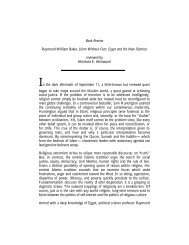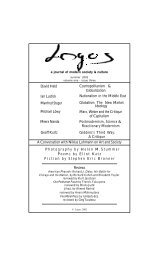Michael J. Thompson Stephen Eric Bronner Wadood Hamad - Logos
Michael J. Thompson Stephen Eric Bronner Wadood Hamad - Logos
Michael J. Thompson Stephen Eric Bronner Wadood Hamad - Logos
You also want an ePaper? Increase the reach of your titles
YUMPU automatically turns print PDFs into web optimized ePapers that Google loves.
Thomas de Zengotita<br />
Some people just went out in boats, just went out to sea with supplies. I don’t<br />
know how it went for them in the later stages.<br />
And, yes, night got to be very welcome. That became when most people went<br />
out and mingled and did their errands. Of course, there had always been a<br />
welcome kind of night, the kind that comes after a really oppressive hot day,<br />
with gentle breezes stirring the trees in the dark around you when you step<br />
outside. Night in general got to be more like that. The dawn got to be what<br />
you dreaded. On some level, you kept expecting things to be alright again<br />
when you woke up. But they never were. That was bad.<br />
In the last stages, the only way you knew the difference between your side and<br />
the other side of anything was through your body habits. If you let it alone,<br />
your body knew what it would feel if you touched a thing—for example, that<br />
you would get a grip on the handle if you reached for the cup this way or that.<br />
But you had to take it for granted. That’s what I learned the hard way from<br />
being with someone when he started to touch things just for the reassurance.<br />
Once he began to do that, he got into this guessing game with himself about<br />
which side was facing his body and very quickly lost his ability to distinguish<br />
between the sides. In one afternoon, actually. I tried to distract him when I<br />
realized what was happening, but he was locked in by then. He would guess<br />
right a few times, and the relief would start to flow, and the desire for more<br />
relief would drive him to another flurry of touching, at which point, of course,<br />
he would miss a few and the fear would come back in that “Oh, god, please,<br />
not again” way that can be so wearing—and back he would go to testing,<br />
lining things up one by one after he had figured out with his hands which side<br />
was which, trying to memorize for each thing which side was which so that<br />
maybe he could learn how to tell the difference again. Impossible to do it that<br />
way, of course. It was a knack.<br />
When he started trying to get me to help him figure it out, I had to cut him<br />
loose. There was no way I could risk it. But that’s how I learned the<br />
importance of taking it for granted in my actions that I knew which side was<br />
which.<br />
Connected with this was not looking at any part of your own body—<br />
obviously never in a mirror, but also not in the course of your routine<br />
activities. The key parts to avoid were your hands and forearms, above all, but<br />
also your feet and legs if you had to look down for some reason. Luckily, this<br />
requirement dovetailed with learning how use your eyes in a general way to<br />
<strong>Logos</strong> 2.3 – Summer 2003




